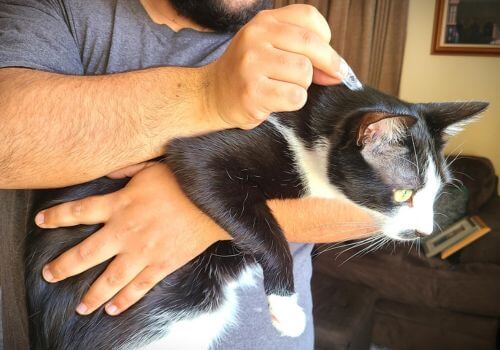An Introduction to Heartworm in Cats
Heartworm disease is well known for affecting dogs, but its impact on cats raises many questions for pet owners. While the initial transmission is similar for both cats and dogs, how the disease progresses in cats is dramatically different - and, in many ways, more complex.
In this article, we'll explore how heartworm affects our feline patients, how it differs from canine heartworm disease, and what you need to know to protect your cat.
What Is Feline Heartworm? How Does It Differ from Heartworm in Dogs?
Heartworm disease in cats and dogs is caused by a parasitic worm called Dirofilaria immitis. It has been diagnosed around the world, affecting hundreds of thousands of pets each year. Once these larval worms are inside your pet's body they grow and develop, invading the heart, lungs, and associated blood vessels, leading to organ damage and, in severe cases, death.
While both cats and dogs are susceptible to becoming infected with heartworms, cats are atypical hosts, meaning that heartworms progress and affect cats differently than dogs. Dogs are among the species that are considered natural heartworm hosts, meaning the worms thrive, grow to adulthood, and reproduce within a dog’s body. Cats, on the other hand, aren’t as favorable of a host, and heartworms struggle to survive in cats, causing them to often die off before reaching maturity and reproducing.
Because of the differences in worm survival between cats and dogs, cats typically harbor far fewer worms than their canine counterparts. In fact, while dogs can harbor dozens – if not hundreds – of adult worms, cats may only have a few - or even just one. However, this doesn’t mean that heartworm isn’t dangerous for cats.
Even a single heartworm can cause a number of serious and life-threatening health comlications in cats. Once infected, a cat’s immune system will aggressively attack the invading parasite, causing significant inflammation and damage to a cat’s organs and tissues. Cats can suffer from this inflammation and organ damage long after the worms have passed, making the effects of heartworm in cats long lasting and far-reaching.

Symptoms of Heartworm in Cats
When it comes to identifying heartworm in cats, there are a few signs pet owners should be on the lookout for, including:
- Coughing or wheezing – This can resemble asthma and is caused by inflammation in the lungs.
- Difficulty breathing – You might see your cat breathing more rapidly or more heavily than usual.
- Vomiting – Even if your cat hasn’t eaten anything unusual, persistent vomiting can be a sign.
- Lethargy or decreased activity – If your cat seems more tired than usual or is avoiding playtime, it could be a red flag.
- Weight loss – A gradual decline in weight can occur in some cases.
How Do Cats Get Heartworm?
Heartworm is not spread directly between animals - it's transmitted by mosquitoes carrying the larval form of Dirofilaria immitis. Common carriers include dogs, coyotes, and foxes, which serve as hosts for the parasite. These animals harbor adult heartworms that produce microscopic offspring called microfilaria, which circulate in the bloodstream.
When a mosquito bites an infected animal, it ingests these microfilariae. As the mosquito feeds again, it can deposit the larvae into a new host — whether that’s a dog, cat, or even wildlife. Because mosquitoes can enter homes, even indoor pets are at risk of exposure.
Hot Spots for Heartworm
Some areas have established populations of wild coyotes that harbor microfilaria and, unfortunately, some neighborhood dogs. Urbanization and a multitude of factors contribute to sustaining populations of mosquitoes all year round. Pockets of areas with warmer temperatures, called heat islands, are found in suburbs and cities, which allow mosquitoes to prolong their duration of activity and reproduction, resulting in the further spread of this deadly parasite.
The Stages of Heartworm in Cats: How Feline Heartworm Progresses
The development and effects of heartworm disease in cats follow a unique and unpredictable course. While the initial infection process is similar to dogs, the way a cat's body responds is very different.
The American Heartworm Society's Feline Guidelines highlight two main stages of feline heartworm disease:
- Reactivity to the arrival of the heartworms to the lung tissue
- Reactivity to the death of adult heartworms later in the life-cycle
Unfortunately, both of these situations generally result in sudden pulmonary failure and often death. When heartworms arrive in the pulmonary artery (the vessel where blood travels to the lungs to become oxygenated) and end up in lung tissue, a cat's reaction is similar to what asthma or allergic bronchitis looks like. If a cat does not react to the initial exposure to heartworms in the lungs, the parasite develops into an adult worm.
Unlike dogs, most cat immune systems do not allow the progression of the heartworms to this part of their life cycle. Because there is usually only one or two worms, and those worms are not typically able to reproduce, all that is left for them to do is mature and die. When a heartworm dies in your cat's body, the immune system overreacts, causing a sudden inflammatory response in the lungs, possibly causing thromboembolism, which is essentially a blood clot formed in the vessel. Unfortunately, these responses often lead to the death of the pet.
The Challenges of Diagnosing Heartworm Disease in Cats
Diagnosising heartworm in cats is much more complicated than in dogs. Dogs have specific recommendations for diagnosis with both point-of-care and reference laboratory testing. These testing options are available for cats but the results they yield in identifying heartworm in cats are not as reliable.
Most canine testing relies on antigen tests, which detect proteins produced by adult female worms. For this test to be accurate, a dog must have at least one male and three female adult worms.
Since cats often have fewer worms - or none that reach reproductive maturity - antigen tests are much less reliable. Cats may also eliminate the infection before worms mature, resulting in false negatives. This makes diagnosing feline heartworm extremely difficult with current testing methods.
Treating Heartworm in Cats
Unfortunately, there is no approved treatment to eliminate heartworms in cats. In contrast to dogs, which can be treated with specific medications like melarsomine, cats must receive supportive care focused on managing symptoms and reducing inflammation.
Medications used to treat canine heartworm are not safe for cats. If heartworm disease is suspected or diagnosed, it's essential to work closely with your veterinarian to develop a customized care plan to safely manage your cat's symptoms and keep them as comfortable as possible.
What You Need to Know About Cat Heartworm Prevention
The good news? Heartworm disease in cats is entirely preventable. Prescription preventatives are available that not only protect against heartworm, but also offer defense against fleas, ticks, and intestinal parasites. Preventive medications are most effective when given monthly, as they target heartworms at a specific stage of development. Missing doses can leave your cat unprotected and at risk. Over-the-counter flea and tick products do not contain heartworm prevention.
In the United States, heartworm has been diagnosed in all 50 states and is now considered endemic in all 48 contiguous states plus Hawaii. That means the risk is present year-round in most regions. To be effective, heartworm prevention must be prescribed by a licensed veterinarian who has seen your pet within the past year.

Heartworm in cats is serious, complicated, and often misunderstood. Even though cats are not the natural hosts for heartworms, they are still at risk - and the consequences can be severe. Because there is no approved treatment for feline heartworm disease, prevention is absolutely critical.
Talk to your veterinarian about starting your cat on monthly heartworm prevention to protect them from this potentially fatal disease.
If you have questions and you'd like to reach out to us, you can call us directly at (218) 692-4400, or you can email us at [email protected]. Don't forget to follow us on social media Facebook, Instagram.

